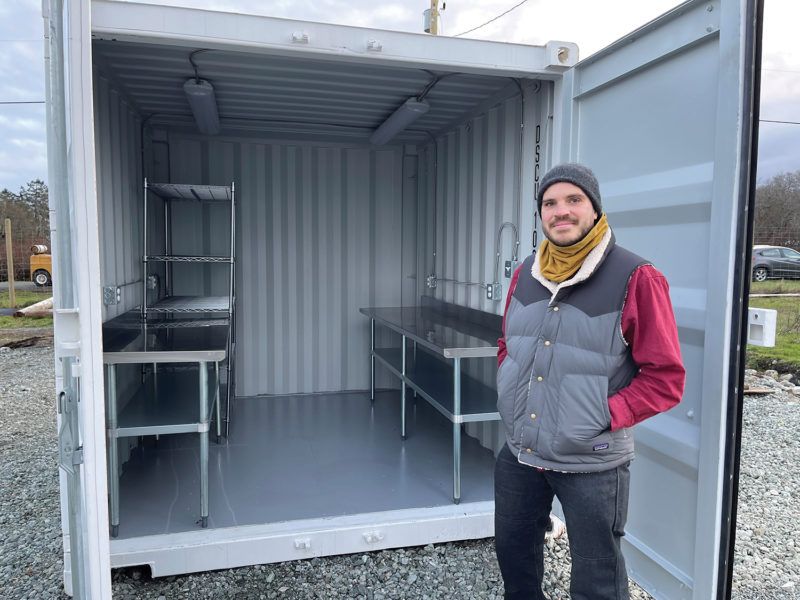NORTH SAANICH – Out in the fields of the Sandown Centre for Regenerative Agriculture in North Saanich, something innovative is happening.
If you drive by the 83-acre site on Glamorgan Road, once home to the Sandown Racetrack, you’d be hard-pressed to see anything out of the ordinary. Sure, there are two new 10-foot shipping containers sitting out there, but those are just used to store tools, aren’t they?
But according to Ty James, the man behind the containers, they’re a game-changer for small farmers that produce field crops, especially those who want to avoid sinking cash into costly infrastructure on leased properties.
James, a 35-year-old market gardener who grows produce on leased farmland in North Saanich and sells to grocery stores like Country Grocer and Red Barn Market, knows what it’s like to move his operations from one farm to another. He used to lease two acres in Central Saanich before outgrowing that space three years ago. He now farms five acres in field production and 20,000 square feet of greenhouses.
“I quickly realized that farming is a business of economies of scale and that I needed more land in order to make a living, and I also needed better infrastructure,” says James. “I was packing in a greenhouse in the summertime that was getting up to 40 degrees. I had a couple little household fridges strapped together, packing into clamshells, just trying to make the most of it.”
It was insufficient for what he needed to do to meet his buyers’ exacting specifications.
James says the CanadaGAP program is one of the must-haves for farmers today, because that’s what larger grocery chains demand. Even though there are about 1,000 farms in BC with GAP certification – the highest rate of participation in the country – James notes that most farmers don’t have it yet, especially smaller growers.
GAP stands for good agricultural practices and James wanted to design infrastructure that would give farmers access to affordable GAP and HACCP-compliant infrastructure. He says CanadaGAP certification is important because it provides assurance to retailers that fresh produce growers are following appropriate food safety procedures.
James believes having access to post-harvest infrastructure is just as important as having fields and fencing. By infrastructure, he means packinghouses and walk-in coolers; a dry place to store labels and packing materials and a cool place to store product during hot weather.
Several companies, like Freight Farms out of the US, sell vertical farming and hydroponic farming systems in shipping containers but through his own company, GAP Can, James is planning something entirely different.
“We’re providing infrastructure for field-growing operations,” says James. “With the heat dome we had last year, it would be virtually impossible to grow successfully without this type of infrastructure. You need access to a shady cold spot to keep your produce fresh as you pack it and get it ready to go to market.”
Two summers ago, he built an early prototype on the farm he is currently leasing with a grant from the BC On-Farm Food Safety Program.
To further develop the concept, James obtained $32,000 through the Canada-BC Agri-Innovation Program and entered into contracts last summer with Sandown Centre and Lytton First Nation to build what he calls “version two prototypes.” James worked with Keith Hayton of K. Hayton Construction Ltd. on the build.
Each unit – built from a shipping container sold off after a one-way trip from China – is custom-built to meet the customer’s needs. That means a lot of discussions on layout and design. They are built to allow producers to achieve CanadaGAP certification, are Canada Safety Association-approved and inspected for road transportation.
“We wanted to design something around CanadaGAP because I get audited on my farm every year,” says James. “We’re trying to service the area of the market that’s like myself, leasehold farmers, people that want to farm but need infrastructure and don’t want to spend hundreds of thousands of dollars to build it.”
The prototype at Sandown was built using two 10-foot shipping containers, avoiding the need for a building permit. One unit is set up for packing and the other is cold storage. Another unit – in a standard 20-foot container – was in the process of being delivered to the Lytton First Nation last month for a large-scale market garden project. Delivery was delayed by wildfires, flooding and mudslides last year.
The little cubes, which arrived at Sandown in January, still need an electrical hookup. Sandown Centre has a 10-year lease on the land from North Saanich and it in turn subleases small plots to farmers. What the centre offers its growers is a cross between land-leasing and farm school that includes learning about horticulture and business.
Sandown director of community and partner engagement Jen Rashleigh says the GAP cubes, as she likes to call them, are a complete and utter game-changer.
Growers will be able to use Sandown’s units this spring to weigh, bunch, pack and store produce, giving them the option to achieve CanadaGAP certification if they want to enter bigger markets.
“If we don’t have a processing unit it’s a major setback,” says Rashleigh. “[With it] they can get the audit and they can get into the bigger retailers.”
Having the units on site means they can also serve as a demonstration for other growers.
The cubes, sold through James’ company GAP Can, come in different sizes and configurations – what James terms modular infrastructure. The company’s flagship unit is a 20-foot container with a vegetable processing area and a walk-in cooler starting around $35,000. Forty-foot containers are also possible for larger applications.
With these prototypes complete, James is now in discussions on two bigger projects, including a multi-unit food hub for Lytton First Nation and a three-unit prototype for a poultry processing plant at Glassen Farms near Nanaimo. He’s also looking for a new yard in Langford for the upcoming builds.


 ALR opened for agritech
ALR opened for agritech